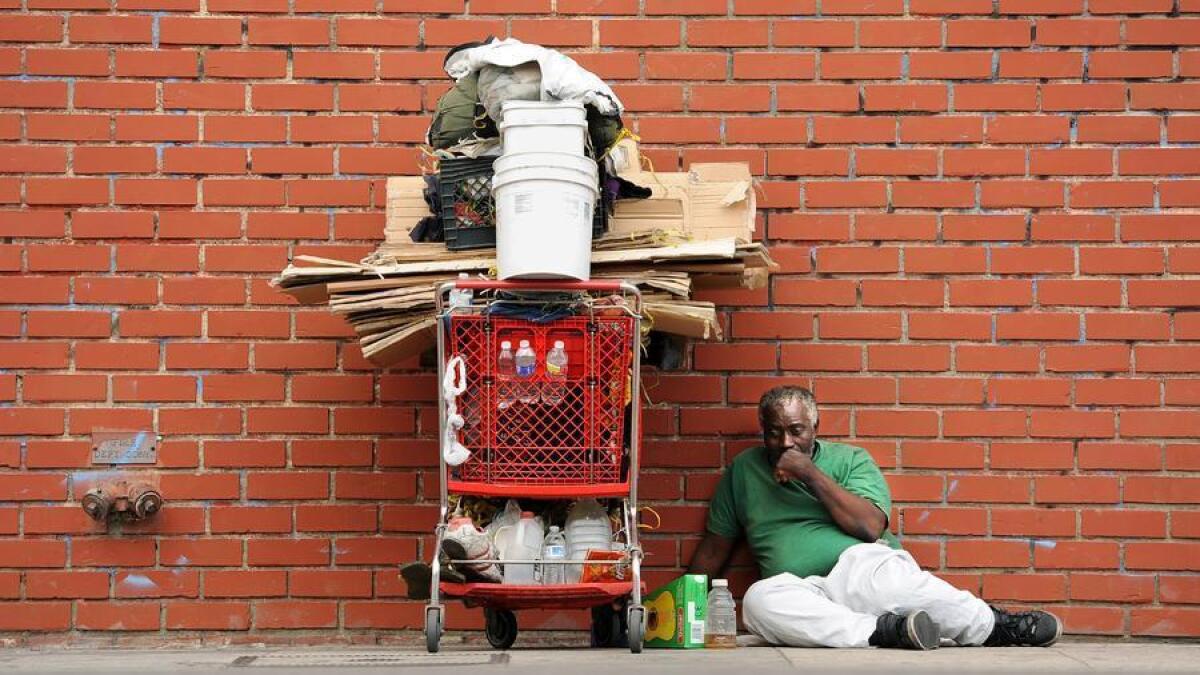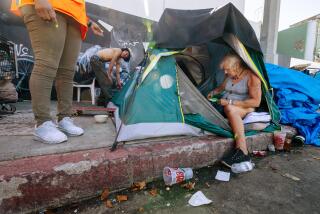Garcetti says ‘battle plan’ is on the way to fight rising homelessness

Figures released this year showed homelessness in Los Angeles had risen 12% since 2013.
- Share via
In the wake of criticism that his administration is falling behind in the fight against Los Angeles’ surging homelessness, Mayor Eric Garcetti said Thursday that his office and other agencies will soon unveil a “battle plan” to take people off the streets.
In a speech at the opening of a housing complex near skid row, Garcetti said he is working with partners on the City Council, the county Board of Supervisors and at the Los Angeles Homeless Services Authority and the United Way, among other groups, to “develop a three-part plan that we’re going to be sharing in about a month ... that is the battle plan for this war on homelessness here in Los Angeles.”
Garcetti said little about what the plan would involve, beyond the expansion of an existing computer system for tracking the homeless and requests for more money and outreach workers from county government.
Nevertheless, his remarks were the first sign that his administration -- which has made efforts to reduce homelessness a core part of its agenda -- is crafting a comprehensive response to figures released this year showing that the problem is getting worse.
On Twitter, the mayor’s office promoted Garcetti’s speech as “the moment when we begin to end homelessness.” His staff declined to provide more information about his plan, however, saying it was still being developed.
“Eradicating homelessness is a top priority for the Mayor. He looks forward to sharing his plan when it is finalized,” Connie Llanos, a spokeswoman for Garcetti, said in a statement.
Garcetti was among the mayors who accepted First Lady Michelle Obama’s challenge to end veteran homelessness by the end of this year. The city is on track to fall short of that goal, however, currently housing on average less than a third of the veterans it would need to take off the street each month.
Meanwhile, figures released this year showed that overall homelessness in the city has risen 12% since 2013, the year Garcetti took office. In April, City Administrative Officer Miguel Santana published a report stating that L.A. spends about $100 million each year on largely ineffective responses to homelessness.
Last month the City Council passed controversial legislation targeting homeless encampments. Garcetti opted to neither sign nor veto the legislation, letting it become law by default.
Garcetti offered few details of the new plan on Thursday, except to say that one of its components is additional investment in a database that matches L.A.’s homeless with housing and other resources. Called the Coordinated Entry System (CES), the program was developed by the Home for Good project, a coalition of charities and government agencies.
Garcetti said the system was inadequately funded and unable to employ “the hundreds of people that we need, not the dozens” to fully staff it.
While L.A. County already pours millions of dollars into homelessness efforts annually, the mayor said he is trying to persuade county officials to invest more.
“This year we added $2.9 million from our city budget to CES, and I’m asking the county, my friends, to match that,” he said. “I know they can do it, and they’ve been wonderful partners.”
He added, “We’ve also asked for the county to match what we’re doing with 20 additional outreach workers in the short term, ones that we can deploy to those places like downtown and Venice where we’ve seen those numbers go up.”
County officials could not be reached Thursday for comment.
Follow @petejamison for more news from L.A. City Hall.
ALSO:
El Niño pushing high temps, rain into California in coming days
Sen. Dianne Feinstein introduces $1.3-billion drought-relief bill
Devastating floods might be more common than we thought
More to Read
Sign up for Essential California
The most important California stories and recommendations in your inbox every morning.
You may occasionally receive promotional content from the Los Angeles Times.














